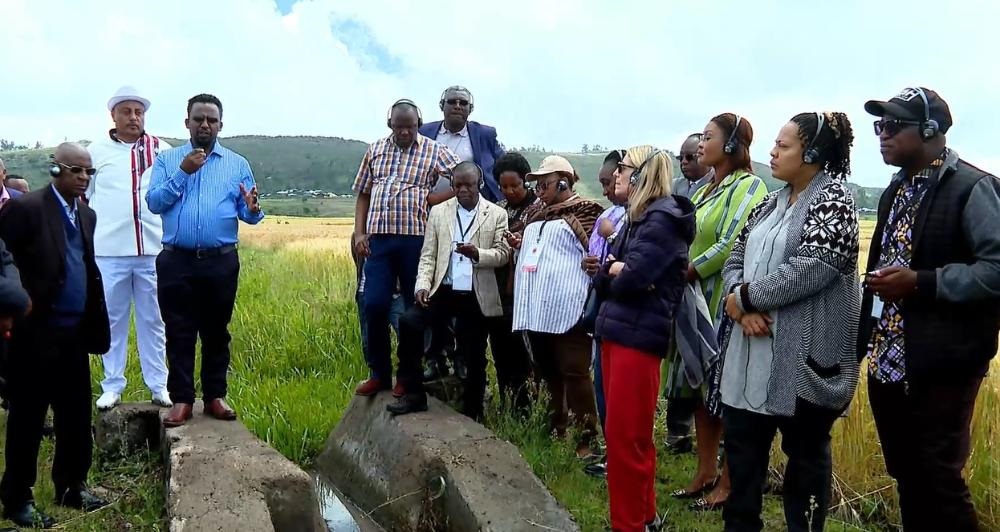Ethiopia's Wheat Export Big Achievement, Milestone For Africa : African Ministers - ENA English
Ethiopia's Wheat Export Big Achievement, Milestone For Africa : African Ministers

Addis Ababa May 3/2023(ENA):- Ethiopia's demonstrated ability to start wheat export to the international market is a big achievement and milestone that could be considered as best practice for Africa, Ministers of three African countries said.
The ministers also praised the commitment of Ethiopian government in strengthening value chain on agricultural products to transform the sector.
Moreover, the ministers were quite impressed with the system the government has put in place in order to transform the agricultural sector and create job opportunities as well as drive the economy of the country.
A total of 14 delegations comprising of ministers and officials from Zambia, Niger, Tanzania and Cote d'Ivoire paid a visit to Ethiopia to look at the experiences of the Ethiopian agricultural development activities.
The visit is aimed at exchanging the best practices and experiences of Ethiopia in transforming agriculture, particularly wheat, avocado, and coffee developments.
Among the members of the delegation, ministers from Tanzania, Niger and Zambia told ENA that Ethiopia has done excellent work in wheat production and the value chain of the agricultural sector.
Tanzanian Minister of State for Regional Administration and Local Government Angellah Jasmine Mbelwa Kairuki said we have seen the over all agricultural development activities in the country.
Noting that Ethiopia previously imports wheat she said, adding right now the country has started exporting wheat.
“This is really a big achievement and milestone. For us, it's also a good best practice for us because we are still importing wheat. That is why we through the entire economic value chain program we want to select wheat to make sure that we also have our ambitious goals, massive ones to see how best we can do to succeed, maybe between three to four years,” she stated.
Moreover, she elaborated that we witnessed the wheat production and value chain in the over agricultural development process in addition to the coffee agricultural processing and avocado farming with their value chain systems.
The delegations have been impressed particularly on seedlings modification across the selected groups, particularly for wheat, coffee and avocado, according to the minister.
She said “we learned a lot from the way they organized the cooperative unions system as well from the farming process, but also the way they provided assurance for the marketing of the crops after they are harvested.”
Zambia’s Minister of Fisheries and Livestock, Makozo Chikote said on his part “it is quite impressive. We have seen the system the region has put in place in order to transform the agricultural sector and create job opportunities as well as drive the economy of the country.”
Furthermore, he stated that we have learned from Ethiopia in terms of wheat production and the cooperative how they are performing.
“I think that is quite important for us, because the cooperatives have demonstrated that they can drive the economy because the system that is in place on how to aggregate, how to bring the farmers together and achieve and increase the production in terms of crop production and become productivity and receive the incentives from the government is quite impressive,” he elaborated.
Minister of Special Adviser to the President and coordinator of Agro-industrial program of Niger, Amadou Allahoury Diallo appreciated the commitment of the government of Ethiopia in transforming the agriculture sector, particularly in wheat, avocado and coffee production with value chain.
Noting that avocado is a new crop that is benefiting the farmers he said, adding “We have also witnessed that the wheat and coffee production has been benefiting the farmers and to the help economic development of the country. These are important achievements in the country.”
The minister said “we have learned a lot about how and what kind of value chain development has been conducted here in Ethiopia. Our objective is to go to our respective countries to implement this best practice. I think that is how African countries can really move forward."